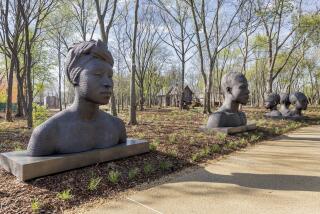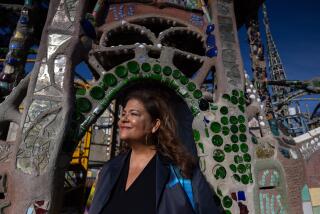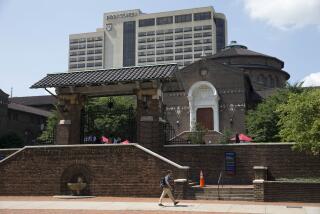Thomas Jefferson statue incites debate at Mizzou
A public statue of Thomas Jefferson on the campus of the University of Missouri in Columbia has generated intense debate at the school -- and more recently, on social media -- over whether the founding father and third U.S. president deserves to be honored given his known status as a slave owner.
The controversy over the work of art landed on the front page of the Columbia Missourian, a daily news organization, on Wednesday. On Twitter, the hashtag #StandwithJefferson has in recent days elevated the debate to a national level, with some claiming that the calls to remove the statue represent an excess of political correctness.
SIGN UP for the free Essential Arts & Culture newsletter >>
An online petition has demanded the statue’s removal from the quad area of the University of Missouri campus. The work of art represents “the dehumanization of black individuals who Jefferson himself viewed as inferior,” the petition states.
But the petition has only garnered about 80 signatures. A competing petition from the Mizzou College Republicans, a student organization, has been passed around campus -- and received more signatures -- calling for students to support keeping the statue.
“I feel like we’re forgetting important moral and political values that Thomas Jefferson stood for,” said Skyler Roundtree, chairman of the Mizzou College Republicans, in a phone interview.
He said that the current culture is one where “when someone takes offense at something, then it should be removed.”
The competing petition states that “we are living in a time where our society has begun to sacrifice morals and traditions only to be politically correct.”
The bronze statue, which depicts Jefferson seated and writing with a quill pen, was unveiled in 2001 and was a gift from multiple trustees of the Jefferson Club, a philanthropic group for the university.
Earlier this month, the statue was covered with adhesive notes with the words “racist,” “misogynist,” “slave owner” and “rapist,” according to reports. The “rapist” epithet presumably refers to the widely accepted belief that Jefferson fathered children with his slave Sally Hemings, who was a teenager at the time.
The Columbia Missourian reported Wednesday on student reactions to the controversy. “It’s offensive to idealize and cherish someone who raped and owned slaves,” said one student.
Others defended Jefferson, citing his role as the primary author of the Declaration of Independence and one of the country’s founding fathers who laid the groundwork for democracy.
The Mizzou College Republicans confirmed reports that one of its black student members, Jasmine Wells, had been the subject of online harassment for expressing her support for keeping the Jefferson statue. The group has posted photographs to its Facebook page showing members draping an American flag around the statue.
On Twitter, Wells identified herself in one of the photos, saying: “And I can assure you that I am quite proud to be in that picture.”
The hubbub over the Jefferson statue comes amid several controversies around the country this year concerning public monuments depicting Southern and Confederate leaders.
The debates follow the June shooting deaths of nine people in a predominantly black church in Charleston, S.C., as well as urban unrest around the country following accusations of police brutality against black individuals.
Earlier this year, officials at the University of Texas at Austin removed a public statue of Confederate president Jefferson Davis following complaints that the work of art glorified the South’s racist past.
The statue of Davis was moved from its outdoor location on the school’s campus to an indoor exhibition space. School officials decided that four other statues of prominent Southern leaders on the campus grounds would remain in place.
In August, Louisiana Gov. Bobby Jindal sought to block the removal of four Confederate statues in New Orleans, following a vote from two city commissions in favor of removing them.
A statue of Confederate Gen. P.G.T. Beauregard in New Orleans was defaced earlier this year with the words “Black Lives Matter.”
In Kentucky, a statue of Davis in the state Capitol building in Frankfort became the subject of public debate over whether officials should have it removed. In August, a historic advisory panel voted in favor of keeping the statue at its location in the Capitol.
Twitter: @DavidNgLAT
More to Read
The biggest entertainment stories
Get our big stories about Hollywood, film, television, music, arts, culture and more right in your inbox as soon as they publish.
You may occasionally receive promotional content from the Los Angeles Times.







